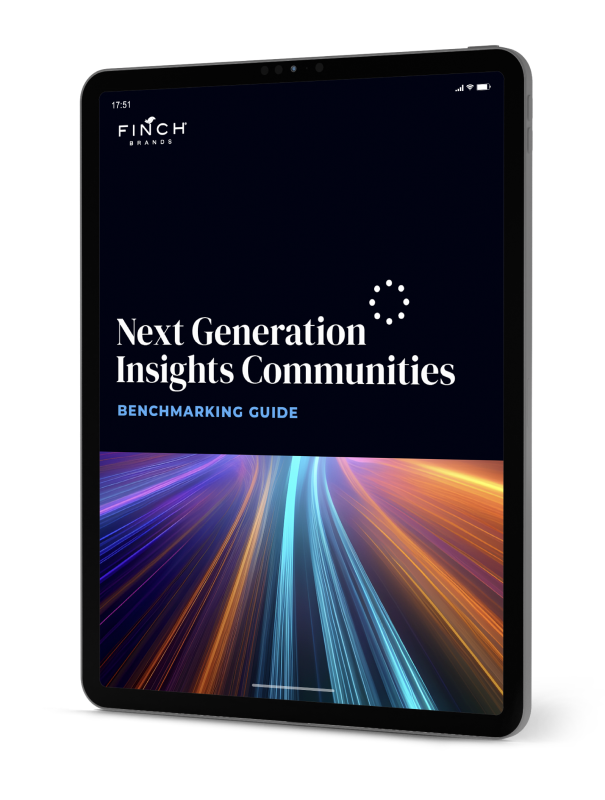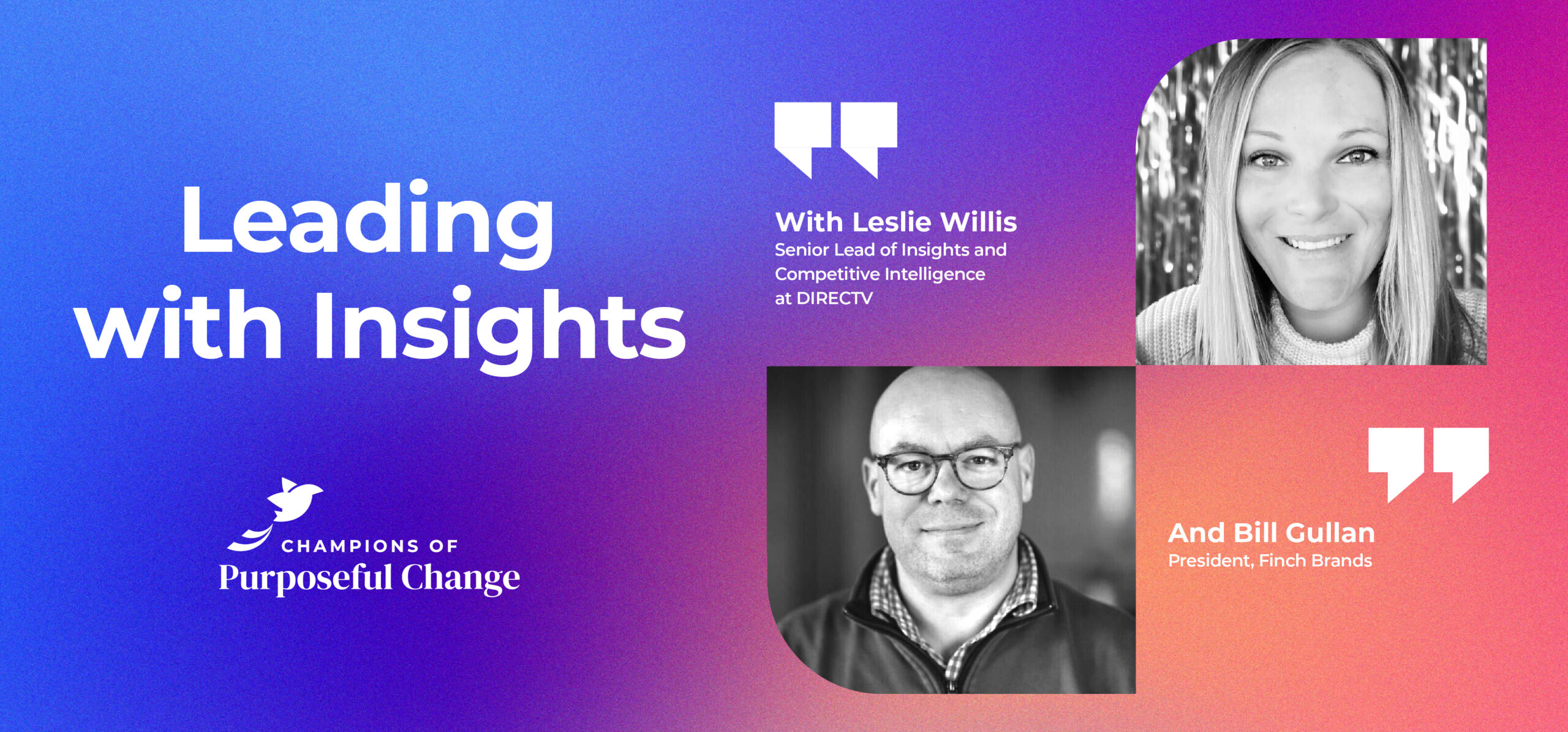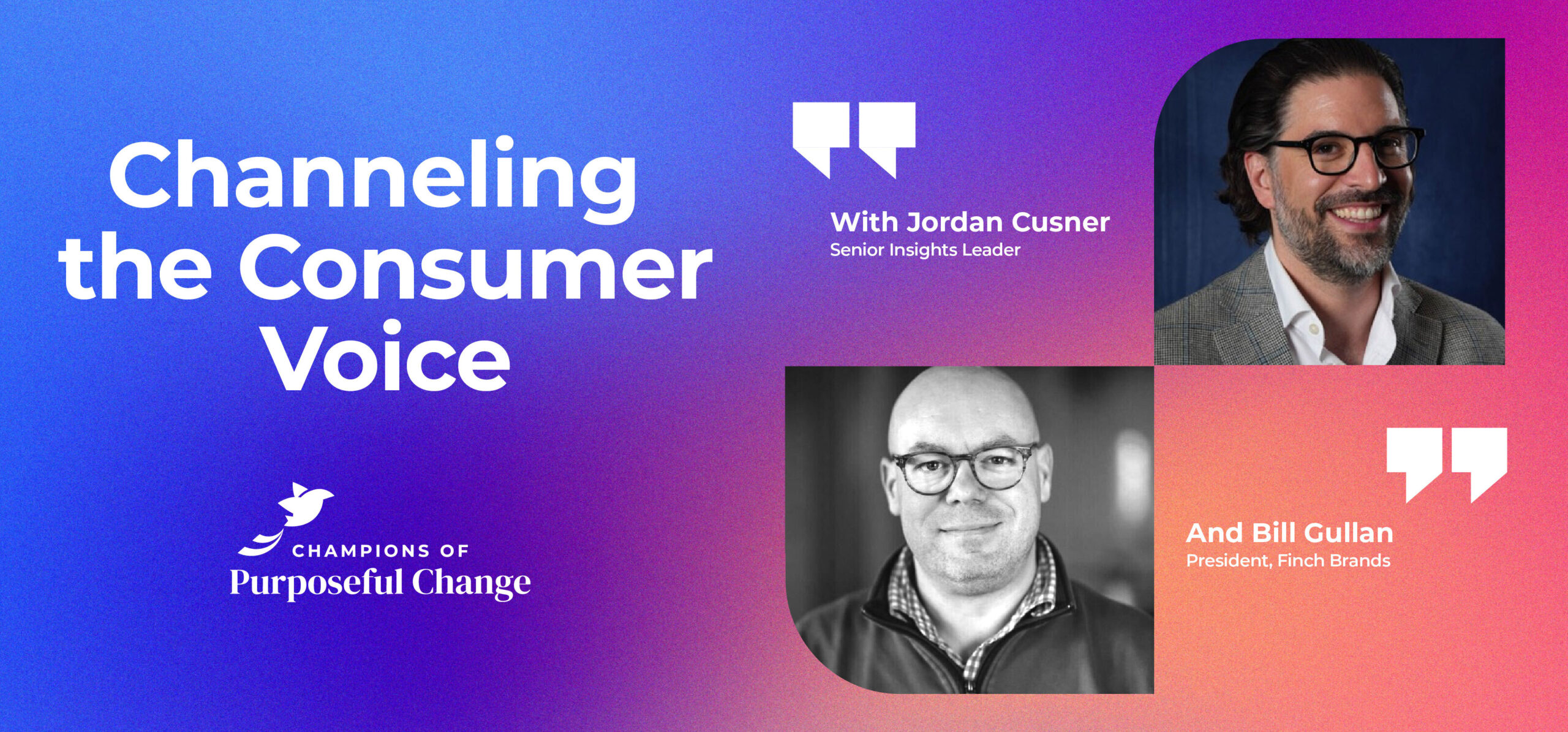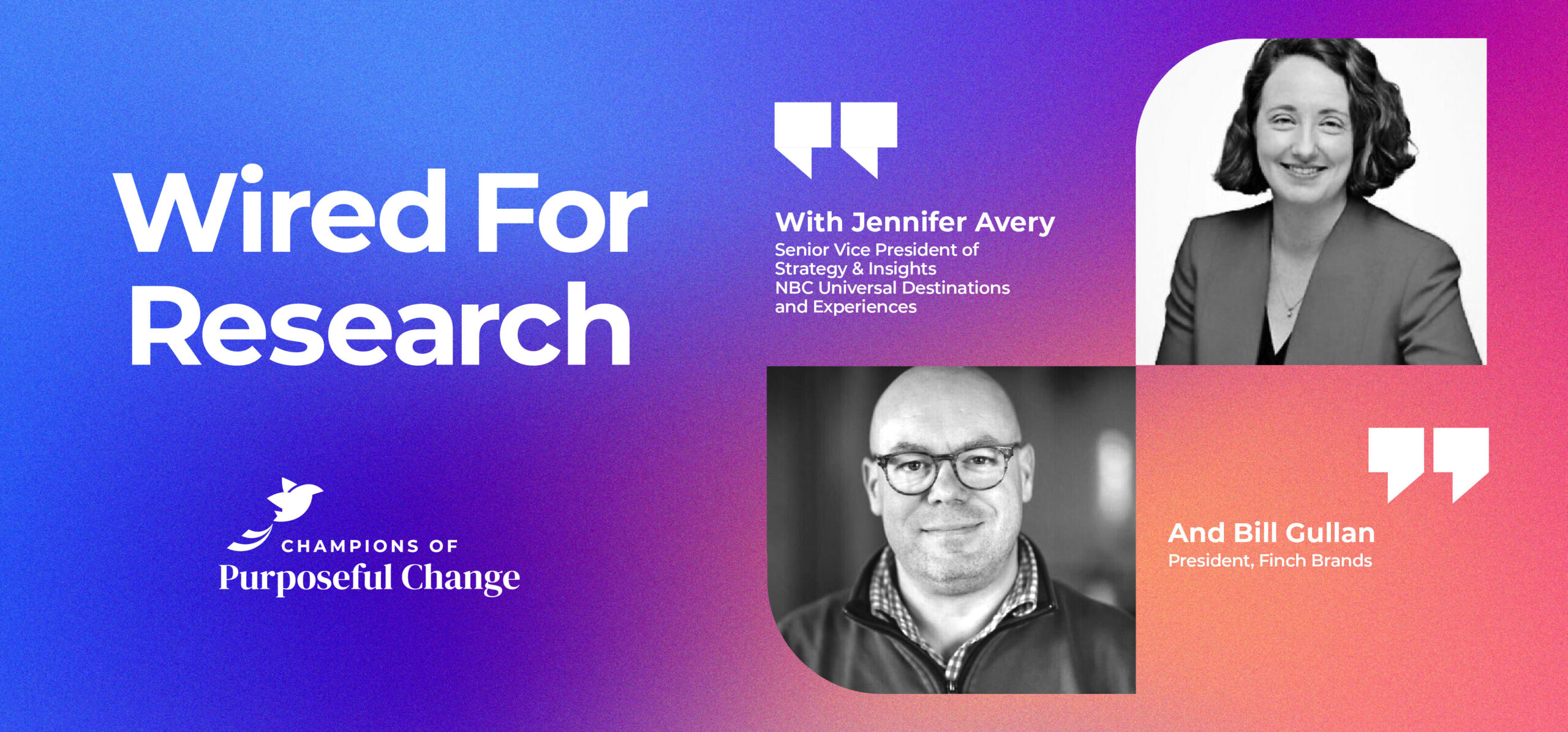Data-Fluent Storytelling with Rebecca Farabaugh
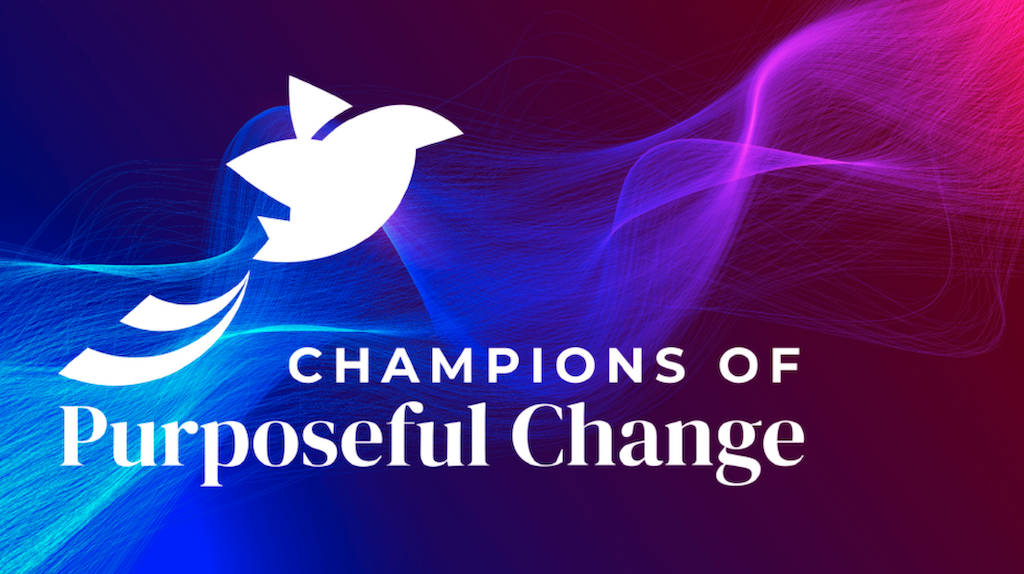
Join us as Rebecca Farabaugh, from Allegheny Health Network in Pittsburgh, takes us through her career journey and into her present role. She’ll share her passion for insights and, importantly, how stories help bring data to life.
Bill Gullan: Greetings one and all. This is Champions of Purposeful Change. I’m Bill Gullan, President of Finch Brands. And today we bring you the sparkle and the insight of Rebecca Farabaugh. Rebecca is in a new role actually, as she’ll tell us, as Executive Director of Stewardship Engagement and Special Giving at Allegheny Health Network in Pittsburgh. But comes there off a role as an insights lead and most recently lead for value of service strategic imperative within her insights manager role at Duquesne Light Company, the leading energy provider in the Pittsburgh area, the Yinzers in Pittsburgh relied on Rebecca and team.
She’s going to speak very directly to a particular passion of hers, which is data fluent storytelling. She will define it. We’ve spoken in this space and in other content a lot about how often the difference between a piece of research that has a profound organizational impact as opposed to a piece of research that lives in a folder or it used to be as a dusty old binder on a shelf in someone’s office, the difference often is in how the data is served up and socialized. We believe that strongly at Finch and Rebecca exemplifies that and we’ll talk about her passion for storytelling as a way of helping data really connect and break through. And that’s an important thing for insights folks, client side and supplier side. Enjoy Rebecca Farabaugh.
We are happy to have Rebecca Farabaugh with us today. Rebecca is actually newly, we’ll talk about this, the Executive Director of Stewardship Engagement and Special Giving at Allegheny Health Network and has quite a fascinating journey leading up to that. Thank you for spending some time with us.
Rebecca Farabau…: Thank you so much. I’m excited to be here.
Bill Gullan: Excellent. And so the day we’re recording this, I’m sure everyone at Pittsburgh is excited about football, we will see by the time this airs whether or not that is still the case, but it’s good to have a Yinzer-
Rebecca Farabau…: I hope so.
Bill Gullan: … from the other end of the state, the commonwealth with us here. And let’s start as we typically do, if you don’t mind, take us a little bit through that fascinating journey. There’s journalism, there’s insights, there’s a lot to what you’ve done and you’re so passionate about much of it, so give us the scoop.
Rebecca Farabau…: Absolutely, yes. So as you said, my official title right now is Executive Director of Stewardship Engagement and Special Giving at Allegheny Health Network, but I prefer to use title that I’ve given myself over the years, which is Data Fluent Storyteller because I truly feel that reflects what I do and who I am. And I’m sure that resonates with a lot of insights professionals because I think that’s really what we are. I often tell people I’m not a data analyst, but I can speak data. And even better than just understanding data, I can see the story that it’s trying to tell us and figure out how to articulate that in a way that is motivating and resonates with other people. So that’s sort of my superpower.
Bill Gullan: Yes, absolutely. Poli-sci undergrad.
Rebecca Farabau…: Yeah.
Bill Gullan: So presumably there was something in there that lit you up. Take us through how you got sort of inspired on this path along the way.
Rebecca Farabau…: Sure. Oh, absolutely. It’s been a long and windy journey, which is a good thing I think. So I actually started when I went to my undergrad, I was communications and political science, I intended to be a journalist and had the great opportunity to do a couple of internships in college. And what I learned in those experiences is that it turns out I’m not at all unbiased and I don’t even want to pretend that I am. And lo and behold, this led me to marketing.
Bill Gullan: Yeah, yep.
Rebecca Farabau…: So that was sort of my path. And I’ve always been a passionate writer. I love writing, I love storytelling and marketing gave me the ability to do that and apply those storytelling skills, but with an agenda, with the ability to speak to what I believe and to bring that part of myself to the work as well, which was so important.
So I started out in nonprofit marketing actually. Worked for a couple of years for a national network of nonprofits that has state presence in states across the country. And from there, I actually became an independent consultant for quite a while. So for about nine years, I was my own boss and continued to do that same kind of work, so marketing, storytelling, branding for nonprofits all across the country. And then somehow, can’t even remember how, but that led me into, I made the transition from nonprofits to higher education, which there’s a lot of similarities there as well as some differences. And so I worked at the University of Pittsburgh, again in marketing and branding. I had really great opportunities to continue that storytelling and creative side. But while I was at Pitt, I realized that I was getting really excited about the numbers side and the data side of marketing, which was a surprise to me. Growing up, I always thought of myself as, I used to say, “I’m not a numbers person, I’m a word person.”
Bill Gullan: Right, right.
Rebecca Farabau…: And was surprised to learn at that point in my career how exciting and interested I was in the science behind marketing and the data side and the research. And so started to explore some of that on my own and actually ended up completing my master’s at the University of Pittsburgh in marketing science.
Bill Gullan: Right.
Rebecca Farabau…: So at this point, I feel that I am both a numbers and a words person. Good balance, brought it all together. And that is where my passion for market research and insights really bloomed. And then I actually ended up moving strictly into the insight space. So I worked with Duquesne Light Company, which is the Pittsburgh area’s public electric utility, doing customer insights, got to work with some really great local and national market research firms and really got to grow that data fluent storyteller side of me. Getting to lead all of the research projects, but then taking all of that great data and new information and translating it into something that was actionable within the business to really make change. So that was a great experience for me. And as you mentioned, most recently, I have actually made the move now to healthcare. So I’ve kind of hit them all. I’ve got nonprofits, higher ed, utilities, regulated business and health.
Bill Gullan: Sure, sure.
Rebecca Farabau…: So I’m running through all the industries throughout my career. But yeah, it’s interesting. I have two 16-year-old boys-
Bill Gullan: Oh, wow.
Rebecca Farabau…: … who are starting to consider college, starting to think about what they want to do with their lives. And I always tell them, “Just do the thing that excites you or makes you happy right now and throw yourself into it, learn it, be passionate about it and then the right opportunities will just find you.” So when I look back on my career path, it’s so funny to me, I often tell my kids too, it’s not like when I was in college I said, “I can’t wait to be an executive director of stewardship engagement and special giving.”
Bill Gullan: Right, right.
Rebecca Farabau…: But I’m so happy to be here now. And saying yes to those opportunities and just embracing curiosity and digging into what inspires you and what’s interesting and take you on a very interesting path and interesting journey in your career.
Bill Gullan: Absolutely. Thank you for that. A couple things to sort of press into.
Rebecca Farabau…: Yeah.
Bill Gullan: Data fluent storytelling, obviously, we as our industry and the world at large, we have access to more data than ever before, but I think based on some of the presentations we’ve heard you give and other things that you’ve posted, are we drowning in data but starved for insight in some ways? And talk about how you sort of see in this, again, world where access to data has exploded. Why is it maybe now more than ever critical to identify stories and threads and things that are uniquely meaningful?
Rebecca Farabau…: Absolutely. That’s such a great question. It can certainly feel that way, drowning in data but not having direction. And I do think that the insights and storytelling piece is absolutely more important than ever. I have a good friend who has been working in data for longer than I have and she recently told me that, she said, “I’m kind of losing faith because I feel like when I present data to people, it either just confirms what they thought was true or they tell me there’s something wrong with the data even if it doesn’t confirm what they thought was true.”
Bill Gullan: Right, right.
Rebecca Farabau…: And I think that a lot of people find themselves in that situation. I know that’s happened to me, when you’re trying to explain what the data’s telling and it can be hard to get people to stay open to really just hearing the truth behind the data. And I think that’s where the storytelling piece comes in.
So you mentioned some of the presentations that I’ve given in the past and I’m actually giving one later this week that is very much about how do you leverage storytelling, humor and just good old-fashioned fun to get people to come along with you on that data journey. So often I think it’s just here’s the numbers, here’s the answer, here it is in black and white and for certain people that is really inspiring and motivating and that’s enough to make a decision. But for a lot of people, I think to really understand it and be open to it, they have to understand whether it’s the person behind the data or they have to understand what makes it interesting or unique, even if it is what they expected and how that can still be really valuable to them and help them achieve their goals. So I do think it’s absolutely more important than ever.
Bill Gullan: Yeah. You mentioned what originally led you a bit away from journalism was at least what at that time, some may argue whether it still is, an objectivity demand from that. That said, you’re also I think speaking about letting the data take you where it takes you, but also you’re someone who comes with conviction to datasets. How do you sort of balance hypotheses or beliefs with the open mindedness, I guess, required for data to have an impact in helping drive decisions and comprehension of what’s happening?
Rebecca Farabau…: Yeah. So I think one of the things that benefits me in this area is just the endless curiosity. So I think one of the things that led me to insights is I’m a very curious person. I always have more questions. I always want to understand things better, differently. And so when I’m approaching data and even when we talk about data storytelling, and that means different things to a lot of people and I know there are some folks in the data who are kind of tired of that phrase.
Bill Gullan: Right, right.
Rebecca Farabau…: And I think my approach to it is a little bit different in that when I talk about data storytelling, I literally am thinking about applying the parts of a story that interest people, that we get excited about to better understand the data. And so one of the big pieces there, I often talk about there’s sort of three main components if you boil it down. So one is characters, you want to understand the characters in your data, whether that’s leveraging personas or however you get there. But if we leverage characters in our storytelling, it instantly creates that human connection and it makes the listener more interested and engaged in the content.
Yeah, so the second element of a story that resonates with every human being is conflict. And so to answer your question, this approach for me I think is what helps me stay balanced and open to what the data has to show even if I have a strong hypothesis or a strong conviction. And what I mean by that is sometimes what we find in the data that we didn’t expect can be the most exciting and most intriguing part because it opens the door to so much discussion and so many more questions and oftentimes more research projects. So I think one of the ways that I stay grounded in that and try and achieve that balance is just remembering that as I’m looking for the story and that data, that conflict, that, “Wait a minute, what? That’s not what we expected.” That that moment is so powerful and I’ve seen it motivate really great action and drive meaningful results so many times that I try and stay focused on that.
Bill Gullan: And so the scientific method is about hypotheses and testing them and so I’d imagine we all agree it helps to have some beliefs and some expectations coming in, but by thinking of it through the lens of stories, it sounds like the motivations of the individuals who are experiencing the phenomena that the data’s trying to explain will help us light the way. Another sort of, you referenced it, but love to hear more, organizations that we work with or for may be comprised of folks who are very fluent and comfortable with data and those who are not. The difference sometimes between research that has a profound impact on everyone and research that, yeah, it’s okay, but it exists somewhere on a shelf, is in how people, I guess, grasp it, rally around it and how it helps them with the tasks and decisions that are right in front of them. What is the role or is there a role for story in helping non-data people get the most out of the insights that the organization has collect?
Rebecca Farabau…: Oh, absolutely. I think storytelling is the best way to get non-data people invested in the findings of the data and seeing what the research has to say. There’s a quote by Jennifer Aaker, who is a marketing professor at Stanford, I want to say, she has a great TED Talk, by the way. Probably a couple, but there’s one in particular that I really love and have re-shared many times on LinkedIn.
Bill Gullan: Is she the daughter of David, the venerable David Aaker? I think they wrote together, right? So they would-
Rebecca Farabau…: Yes, yes.
Bill Gullan: Yeah.
Rebecca Farabau…: Exactly.
Bill Gullan: Go ahead.
Bill Gullan: Absolutely.
Rebecca Farabau…: Sorry.
Rebecca Farabau…: Yeah. So she has a great quote that says, I won’t do it justice or get it word for word, but something along the lines of human brains are not hardwired to remember facts and numbers for a long time, but we are hardwired to remember stories. So to me, that being able to move away from here’s a chart and 96% that and 42 this, to move away from that and be able to say think of the person at the end of the work that you’re doing and here’s what the data says that person is experiencing, telling a story. We often in marketing leverage personas. So thinking back to my days at DLC, we did a study on what types of communications customers wanted to have when there’s an outage. If you’re an electricity customer, which most of us are, we know that an outage is a pretty big inconvenience.
Bill Gullan: It sucks.
Rebecca Farabau…: And so we wanted to understand what kind of information do you want? How much grace is there? On what timeframe do you need it? And things like that. Got a lot of really great data back and could have just presented it the way that it was. But instead, my team and I chose to present it from the perspective of one of our personas. So to be able to say this is Sally and Sally’s life looks like this. Sally, she works from home, she’s got three kids. It’s a hot summer day, they’re making her crazy and her power goes out. She can’t work. She’s got to figure out what to do with, right?
Bill Gullan: Yep.
Rebecca Farabau…: So it allows you to set the stage where all of a sudden when you say, “And Sally needs this information to be able to make the decisions she needs to make in her daily life,” you’ve already made the connection for someone. And we can always, I think humans have a great ability for empathy to be able to put ourselves in other shoes or relate someone else’s experience to things we’ve experienced in the past. And so I think just that linkage makes it so much more clear and real.
Bill Gullan: Right. Related to that, as insights people, you and I probably both agree, I won’t speak for you, but I think qual and quant work really well together. But what would you say to someone who is really more quant driven and doesn’t appreciate the value of qual in creating the depth, the texture, the story that really helps people get it? Because again, quant data is far easier to come by than it ever was, big data and these sort of massive sets that are designed to at least, whether it’s NPS or whatever, just give you a sense of what’s happening. In such a world, what is the role of qual?
Rebecca Farabau…: Wow, that’s a tough question. Let me think.
Bill Gullan: Because I guess, let me give you a little more then.
Rebecca Farabau…: Sure.
Bill Gullan: What do we know about Sally purely through quant? And then what do we learn about Sally by really talking to her as opposed to just the quant will sort of indicate her behavior, her level of satisfaction, what she did, what thousands of people like her did? And then we’ve had some clients who were sort of naysayers about qual and I’ve always found that some of the, again, to use the same word, texture, comes from those types of interactions, focus groups, one-on-ones, ethnography, all the typical qual methodology. So I didn’t know if you had a POV on how qual and quant together can help really paint the stories that are essential to the point you’re making.
Rebecca Farabau…: Yeah, absolutely. Absolutely. Yes. And I agree with you. I think quant and qual go so well together to really get a holistic picture. For example, if I’m thinking about a customer satisfaction survey and we can look at all the numbers and we can track those things over time and trends and there’s so much value in being able to do that.
Bill Gullan: Yeah.
Rebecca Farabau…: But when I’m putting together a report to say, “Well, why did it change? Why did this drop six points,” or rise 12 points or whatever it is, that change over time, when someone asks me why, to me where that qual piece comes in. That’s where I go to the open-ended responses. Or that’s where we dig into a particular issue with a panel or with interviews or with focus group. Because I think quant is wonderful for understanding, like I said, those trends and your performance and the numbers and things like that. But it’s the why I think that qual really provides. And that’s where the story comes in. But it’s also, it’s not just the story, it’s where the solution lies. Because even if I understand that something is changing without understanding why, then I can’t respond to it. So to me, that’s really the power of bringing in the qual side.
Bill Gullan: No, absolutely. You mentioned sort of Sally and personas, those are some of the tools of the trade. For storytelling, what are some of the methods of delivering those stories? Personas is sort of one way to do that.
Rebecca Farabau…: Yeah.
Bill Gullan: Are there other things that you found that the audience might find helpful in terms of really whether it’s personifying or bringing to life the stories that you think really help people kind of get it and embrace it?
Rebecca Farabau…: Absolutely. Absolutely. I’ve mentioned this before a little bit, but when I boil it down to the three parts of a story that I think are most activating, it’s those characters, conflict and a conclusion. So it’s that connection to people. It’s the tension, it’s the surprise, it’s the twist ending. It’s like, “Wow, I didn’t see that coming at all.” But it’s also that conclusion piece. So I think oftentimes when we are looking at data, we are absorbing just the information in front of us and we kind of stop there. And we don’t continue the conversation with our clients or coworkers to say, “So then what?” Right? And so I think focusing on that conclusion piece, saying, “Hey, here’s the what happened and here’s to who and here’s the impact, but what can we do with that?” And really starting that conversation about solutioning and problem solving as part of the data conversation, moving things that direction.
One example that I think of from a recent study was we were getting information on sort of different causes that our customer base supported. And one of the ways that we then used that when we reported it out was to help our communications and corporate responsibility group develop a matrix for sponsorships. So rather than just saying, “Hey, our customers care about,” I’m making this up, but pets and gardens or whatever, we were able to say when we presented that information, “And here’s how that could fit into this project that I know that you’re working on. Here’s how this can support you and move this work forward and make it better and stronger and more meaningful.”
Bill Gullan: Makes sense. You mentioned the recent transition to healthcare and I think within, what a rich set of stories. I can imagine, given the gravity in some cases, the gravity of the… You’re also, it sounds like, on the development side, the sort of fundraising. We talked a little bit before we recorded a few weeks back about how that audience, those audience donors and others will be activated maybe even to a greater degree than corporate decision makers by stories. But talk about sort of how in your new role these passions may come to life.
Rebecca Farabau…: Oh, absolutely. Yes. No shortage of amazing stories to tell, for sure. And certainly makes the time data to the human element, it just is so obvious right in front of you. In a way that in some other industries, you really have to work hard to build that connection, this it’s front and center all the time. I’m just getting started. I’ve actually only been there a little under two months. But one of the primary things that I am focused on right now is really figuring out what is the research component? What is the insights component that my team really needs? And already, I can see how widely it varies from the development perspective, it’s a matter of understanding what donors at different levels might expect or what might delight them. And then on the other hand, it’s using more of the qualitative side to be able to understand motivations to give. So not just how we’re recognizing them, but what do they really care about? What’s underneath it? What’s their why?
Bill Gullan: Right.
Rebecca Farabau…: Yeah. So it’s a really rich landscape. I’m very excited to dig in and get some programs up and running.
Bill Gullan: I’m sure there’s a ton to it.
Rebecca Farabau…: Oh, my gosh. It’s so interesting. Yeah.
Bill Gullan: Yeah. And even only a few months in, I’m sure your mind is spinning with possibilities.
Rebecca Farabau…: Absolutely. Absolutely.
Bill Gullan: That said, we do not in the market research world want to lose you completely to the development landscape-
Rebecca Farabau…: No, not at all.
Bill Gullan: … or the healthcare. So as you’ve been to I know some of the same events that we’ve been to and often been at the rostrum delivering your thoughts, it could be in your storytelling lane or it could be other things, well, what’s catching your eye out there in the insights world these days? There’s a lot of things obviously that change over time. There’s wonderful chestnuts that remain true. Everyone wants to talk about AI and there’s a lot of stuff. So what’s that next frontier look like and what are some things that have intrigued you based on things you thought about or things you’ve seen?
Rebecca Farabau…: Yeah. One of the things that I always am drawn to at conferences or when I’m reading articles or just will always sort of catch my eye is the creative ways that people are constantly coming up with to share data, activate data, embed data. So I am a big advocate of humor. I say that my personal mantra is my mission is to make meaningful work fun because I do believe work can be both meaningful and a lot of fun.
Bill Gullan: Some days, yes.
Rebecca Farabau…: Not every day.
Bill Gullan: Right, right. Sure.
Rebecca Farabau…: But it can be. Yeah. So really interested in those sort of creative ways from, you hear about people who are… And we actually did this at Duquesne Light, we hosted a game show day to help people learn about our personas.
Bill Gullan: Yeah, yeah.
Rebecca Farabau…: We did Family Feud which was based on survey data from our customers.
Bill Gullan: Excellent.
Rebecca Farabau…: So I’m always very interested in those unique and fun approaches. Another passion of mine is human centered design. And that is not new to the insight space. That’s a tool that’s been in the toolbox for a long time, but I still find it so valuable. And it’s such to me, those human centered design methodologies are right where my head’s at as far as that bridge between the data and the story and getting people connected and into the data in a way that you can’t without that kind of collaborative and interactive experience. So also always looking at new ways that human centered design is being leveraged, both in the research itself as well as in the reporting.
Bill Gullan: Right. For those who may be less familiar with human centered design and sort of what it means and how it works, could you give us a handy definition and maybe an example or two of kind of what has lit you up about it?
Rebecca Farabau…: Yeah, sure. So human centered design is a methodology for creative problem solving with the goal of keeping the human at the center. So acknowledging that every problem we’re trying to solve, we’re trying to solve it because it’s not working for a person. So no matter what it is, if it’s a technical problem, it’s a process problem, at the end of the day, you’re solving it for a person. So how do we keep that human focus in the center? One of the big tenants of human centered design is also collaboration. So it’s basically a toolkit of different methodologies that you can use where you work in small groups, all sorts of different activities, but basically, they’re all ways to think outside the box and to think and challenge each other as humans on what a solution to the problem might be and what solutions might exist that we haven’t thought of yet. Or that you can sort of arrive in a small group sharing thoughts and pushing each other that you couldn’t if you were trying to solve that on your own.
So I fell in love with it as soon as I first experienced it. I am certified in human centered design as a practitioner with the LUMA Institute, which is, LUMA always says, “We didn’t invent it and we don’t own it, but we do teach it.” Right?
Bill Gullan: Yeah, right.
Rebecca Farabau…: So yeah, I’m just really passionate about it. I think it really does unlock solutions that I haven’t seen arrived at in sort of other sorts of problem solving settings.
Bill Gullan: Yeah.
Rebecca Farabau…: And it’s also fun.
Bill Gullan: Right, right.
Rebecca Farabau…: Which is very important to me.
Bill Gullan: It’s important, yes. And I’d also imagine that thinking around those methodologies and that sort of mindset helps some of the industries that you’ve been in, talk about electricity, for example, healthcare, higher ed, that may not historically have been as consumer, to use for lack of a better word, focused.
Rebecca Farabau…: Yes, absolutely.
Bill Gullan: That thinking can break down some walls probably.
Rebecca Farabau…: Absolutely. And shift to that innovation mindset.
Bill Gullan: Yeah.
Rebecca Farabau…: Because many of those, most of the places I’ve worked have celebrated their 150th anniversaries already.
Bill Gullan: Right.
Rebecca Farabau…: So there’s a long legacy and history, which is such a strength in so many ways, but it can sometimes lead to cultures that are less innovative or, like you said, less sort of customer focused. And so it is a great way to get people to think differently and really start to work together in new ways.
Bill Gullan: Excellent. So speaking of which you gave us, we’ll end with this, I want to keep my promises in terms of your schedule, but you did share that you have some advice for your 16-year-olds. Are they driving? Are we driving yet? It’s close, right?
Rebecca Farabau…: Oh, my gosh. Yes. Both of them.
Bill Gullan: Oh, my goodness.
Rebecca Farabau…: One’s been driving since June. The other just started about a month ago.
Bill Gullan: Oh, my. I can imagine it’s liberating and terrifying at the exact same time.
Rebecca Farabau…: That is exactly true.
Bill Gullan: Right.
Rebecca Farabau…: Yes. Yes, it is all of that at once.
Bill Gullan: Good, good. Well, so you had some advice for them as they think about college and what’s after. But for the part of our listenership who may be starting out or starting over who’s inspired by your path and how you’ve found your way towards things that you’re passionate about, any words of wisdom you’d share with folks who are at that juncture trying to decide what’s next and not really sure how to do it?
Rebecca Farabau…: Yeah, absolutely. I think my first piece of advice would be to focus on what brings you joy. So find the things that you do that bring you joy, whether it’s writing or being outside or spending time with your family or whatever it is. And to me, those kinds of activities, those are the things that we want to try and do more of at work, right?
Bill Gullan: Yeah, sure, sure.
Rebecca Farabau…: So finding the things that bring you joy anywhere in your life and then finding ways to bring that into your professional life as well. Not only does it make our days just more enjoyable, but we also tend to be better at the things that we actually like doing.
Bill Gullan: Right.
Rebecca Farabau…: So I have found really trying to focus on being guided by what brings me joy as opposed to trying to focus on, well, what am I good at or what does someone else need.
Bill Gullan: Right.
Rebecca Farabau…: Really what brings me joy. And I guess related to that too, is also just to really stay curious. Like I said, I think just try to say yes to every opportunity, stay open to every possibility, ask a lot of questions. And I think between leading with joy and staying open and curious, I think everyone can find a really satisfying and meaningful path.
Bill Gullan: Yeah.
Rebecca Farabau…: And hopefully one that’s a little bit fun too.
Bill Gullan: Yes, absolutely. Well, that’s a perfect place to leave it, Rebecca. Thank you so much for your time. Congrats on the new role. It’s a fascinating set of questions and all the things that you bring both in terms of hard skills, but also your mindsets and your demeanor, I think will serve the organization well and we can’t wait to hear.
Rebecca Farabau…: Thank you so much. I really appreciate it.
Bill Gullan: Yeah, pleasure. Thank you to Rebecca, such passion and experience and insight. We’re grateful to have had the benefit of that. Give us a solid here at Champions of Purposeful Change, a couple of different ways you can. One, click subscribe, make sure these float down magically to your device of choice every time there’s a new episode, which is monthly at this point. Two, rate and review. Make sure that we can hear your feedback. Also, if you like what you’re hearing here, make sure that our profile can get elevated through that process.
Podcasting is sort of mysterious in some ways, one of the things we hear again and again is that the more engagement you have within ratings and subscriptions, et cetera, really helps increase visibility. So if you think that you’re enjoying this and others might as well, rating and reviewing will help us tremendously. And then Lastly, let’s provoke that dialogue. We love ideas for future guests and topics. We certainly love feedback on what we’re doing well and what we’re not. Our skin is thick. And @BillGullan, @FinchBrands on Twitter or through any social media channel or directly through email, bgullan@finchbrands.com, is fine as well. Hope you enjoyed today. We’ll sign off from the Cradle of Liberty.

